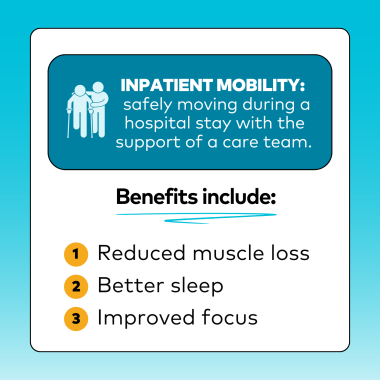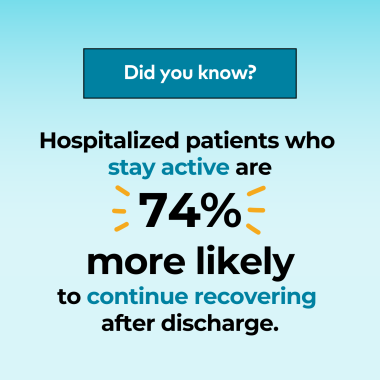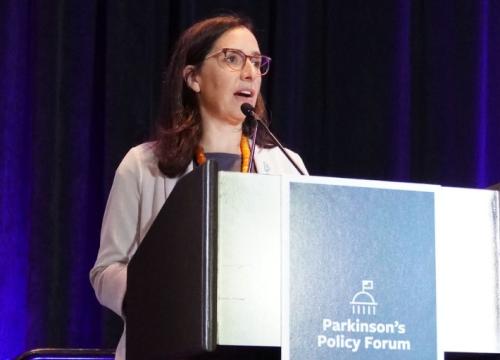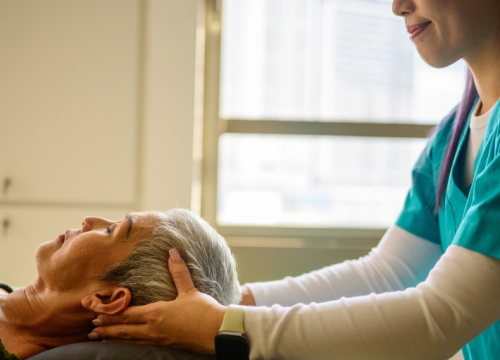Study Shows Staying Active in the Hospital Benefits People with Parkinson’s

Research shows that people with Parkinson’s disease (PD) are hospitalized more often, visit emergency rooms more frequently, and are more vulnerable to complications while hospitalized.
Exercise and physical activity not only help people with Parkinson’s maintain or improve mobility, flexibility and balance when it comes to managing symptoms, but regular movement can mean big benefits in the hospital. As a hospital patient, movement — often with support from physical and occupational therapy — is essential for preventing falls and minimizing complications.
A new study finds that staying active (inpatient mobility) in the hospital benefits people with Parkinson’s. Published in Parkinsonism & Related Disorders, the Parkinson’s Foundation-supported study looks at how University Hospitals (UH) located in Cleveland, OH, Move to Heal Program, a hospital system-wide mobility program that aims to mobilize all inpatients at least three times daily, affects patients with PD.

Inpatient mobility refers to safe movement during a hospital stay (in and out of bed) with the approval and support of a care team. Benefits include:
-
Reduced muscle loss
-
Better sleep
-
Improved focus
A lack of mobility in older patients while hospitalized is associated with reduced mobility and increased mortality after being discharged.
Study Results
To learn more about the outcomes of inpatient mobility for people with PD, the study used data from patients admitted at the hospital for more than 24 hours between February to September 2023, comparing 300 hospital patients with Parkinson’s to 12,000 patients without PD. Each group was further divided into an:
-
Active group: three mobilizations or more per day. Mobilizations included active or passive range of motion performed in bed, sitting at the edge of the bed, sitting on a chair or bedside commode, standing and walking.
-
Inactive group: less than three mobilizations per day.
Data showed that inpatients with PD in the active group had a shorter hospital stay and higher probability of returning home after hospitalization. This supports the Parkinson’s Foundation Hospital Care Recommendations, which advocates that people with PD mobilize three times a day under professional supervision.
Notably, all patients who stayed active while hospitalized were 50% less likely to die within 30 days of being released from a hospital stay, and 30% lower odds within 90 days.

Hospitalized patients who stayed active were 74% less likely to be discharged to hospice care or die compared to inactive patients.
Overall, the study suggests that frequent mobilization significantly decreases length of stay and likelihood to be discharged home for patients with Parkinson’s, in hospitals with mobilization programs.
Highlights
-
The Parkinson’s Foundation partnered with University Hospitals to better understand how staying active in the hospital (called inpatient mobility) impacts people with Parkinson’s.
-
Study data compared 300 hospitalized people with Parkinson’s with 12,000 hospitalized patients without Parkinson’s.
-
People with Parkinson’s who were mobilized at least three times a day while admitted had a shorter length of stay and were more often discharged to home (rather than a care facility) than those who were not mobilized at least three times per day.
-
Patients who stayed active while hospitalized had 50% lower odds of dying within 30 days of being released from a hospital stay, and 30% lower odds within 90 days.
-
Both groups that were active (with and without PD) had shorter hospital stays than the inactive group, but the impact was more significant for those with PD.
-
Only the active PD group showed an increased likelihood of going home after discharge.
What does this mean?
For people with Parkinson’s, staying mobile in the hospital can make an enormous difference when it comes to recovery and being more likely to go home instead of another care facility.
Mobility in people with Parkinson’s is an important aspect of managing PD symptoms, while at home and in the hospital. This study shows that people with PD are prone to longer hospital stays and increased mortality rates if not moving regularly in the hospital.
For many, it can be difficult to advocate for regular, scheduled movement when you are facing health concerns or complications that lead you to the hospital. This study supports Parkinson’s Foundation efforts to promote system-wide inpatient mobility programs, showing significant benefits to patients and hospitals — especially those with PD. Over time, these programs can help improve quality of care.

What do these findings mean to the people with PD right now?
Each year more than 300,000 people with Parkinson’s receive care at a hospital in the U.S. Unfortunately, approximately one in six people with Parkinson’s are estimated to experience avoidable complications during a hospital stay.
However, there are many ways to advocate for yourself when preparing for or experiencing a hospital stay. The Hospital Safety Guide contains useful tools and information to help you during your next visit. This guide highlights five hospital care needs, with advice on how to talk with your care team regarding movement in the hospital and beyond.
Learn More
The Parkinson’s Foundation believes in empowering the Parkinson’s community through education. Learn more about PD and mobility in our below resources, or by calling our free Helpline at 1-800-4PD-INFO (1-800-473-4636) for answers to your Parkinson’s questions.
Related Materials
Related Blog Posts

Shaping the Future of Parkinson’s Policy: Meet Our Chief Strategy and Policy Officer

